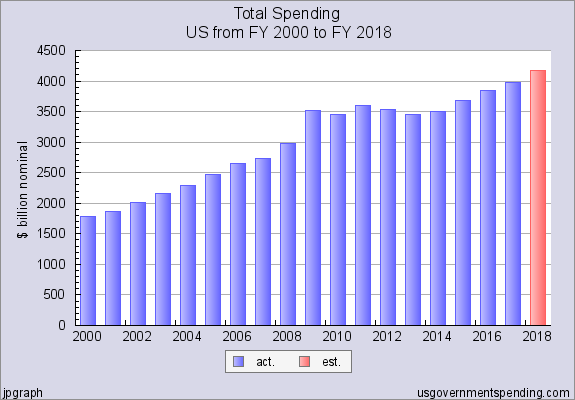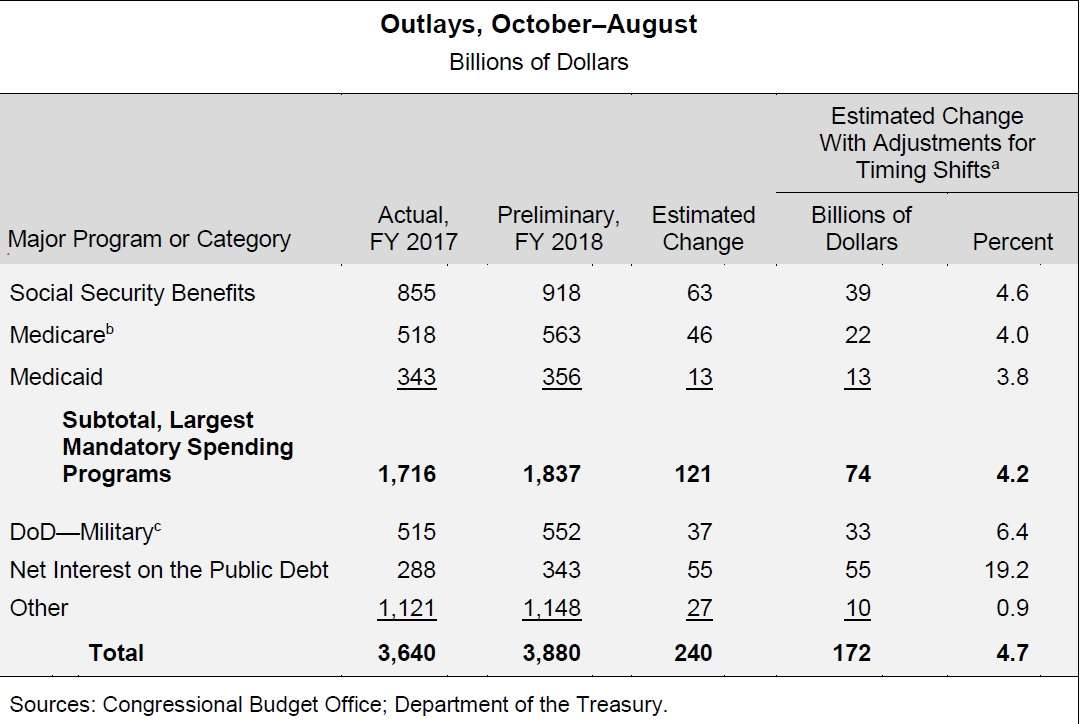#MAGA: Federal Deficit Jumps 32 Percent, Hits $895 Billion for Fiscal 2018!
The economy might be humming but when are we going to have to, you know, pay for the party already?

Never let it be said that Donald Trump and congressional Republicans don't know how to spend money. According to the Congressional Budget Office (CBO), these guys have been slapping down government plastic like the bill is never, ever going to come due:
The federal deficit hit $895 billion in the first 11 months of fiscal 2018, an increase of $222 billion, or 32 percent, over the same period the previous year, according to the Congressional Budget Office (CBO).
The nonpartisan CBO reported that the central drivers of the increasing deficit were the Republican tax law and the bipartisan agreement to increase spending. As a result, revenue only rose 1 percent, failing to keep up with a 7 percent surge in spending, it added.
Some of that increase was due to "timing effects," such as holidays that meant some outlays were made in August this year and September last year. But even when you account for all that, says CBO, the increase in spending still comes to 4.7 percent and the increase in the deficit is $154 billion. Remember, that's with a Republican Congress and president. Isn't the GOP supposed to be the party of fiscal discipline?
Spend, spend, spend has been the federal mantra for virtually all of the 21st century, whether the presidents and majorities were Republican or Democratic. True, there was a flattening of spending for a coupla-three years a while ago, but that was only after a major upchucking of funds at the very end of the Bush years and start of the Obama era (TARP, other bailouts, and stimulus plans weren't going to pay for themselves). The chart below shows total federal spending in nominal dollars and the trend line isn't a pretty picture if you believe that government spending is a major indicator of how much control the government wields over your life:

Federal budgets of $2 trillion quickly gave way to ones spending more than $3 trillion and, well, why not just kick it up to $4 trillion? As Reason's Peter Suderman noted recently in The New York Times, neither party has even pretended to be serious about deficits and debt for a very long time, so runaway spending shouldn't be surprising.
But that doesn't mean the rest of us shouldn't be concerned. Over the course of this century, more and more of federal spending is deemed "mandatory," meaning that it's not subject to annual reviews or course corrections. On top of that, the single-largest "discretionary" outlay is defense spending, which always seems to go up, too. As the CBO notes in its latest monthly budget review, which covers the first 11 months of fiscal 2018, there's very little restraint.

The return of trillion-dollar deficits is not a welcome development, especially given all the debt our government is already carrying. The federal government's total or gross debt—the amount it owes to the public and to itself—has been over 100 percent for the past seven years. Economists on both the right and the left agree that long periods of such high levels of debt depresses economic growth, sometimes for decades. It's good news that economic growth in the last quarter clocked in at over 4 percent in annualized terms, but there's every reason to believe that spending more and more money that you do not have doesn't end well, for individuals or for nations.
The CBO projects economic growth over the next decade to average just 1.9 percent a year over the next decade, which compares incredibly poorly to average annual rates of about 3 percent for much of the period between the end of World War II and the start of the new century. Pushing for fiscal discipline, regardless of which party is in power, isn't something you do for style points; it's one of the underpinnings of strong, long-term economic growth that improves living standards.
Related: "Why We Need Less Debt, and Fast!"


Show Comments (121)